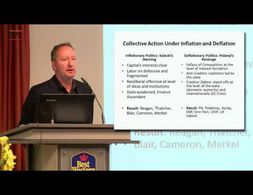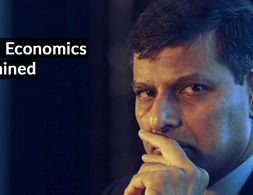✕
7 results
Mark Blyth criticises the political inability to solve the persistent economic crisis in Europe against the background of a deflationary environment. Ideological blockades and impotent institutions are the mutually reinforcing causes of European stagnation. The deeper roots lie in the structural change of the economic system since the 1980s, when neoliberalism emerged as hegemonic ideology. This ideology prepared the ground for austerity and resulting deflationary pressures and a strategy of all seeking to export their way out of trouble. Worryingly this is breeding populist and nationalist resentments in Europe.
In this short video 'Raghuram Rajan’s Dosa Economics Explained', the famous theory of Dr. Raghuram Rajan, ex-governor of Reserve Bank of India (RBI), Dosa Economics, has been explained using a very simple example of Dosa ( a delicacy of India). Here, Dr. Raghuram Rajan tries to explain that low interest rate and low inflation is much better than high interest rate and high inflation.
This is webinar series organized by the SOAS Open Economic Forum and the SOAS Economics Department with speakers from the same department as well as other academic figures.
This is a new online course at bachelor level. It presents an introduction into macroeconomics with a specific focus on the euro area. The theoretical part provides a critical presentation of the two key macroeconomic models: the (neo)classical approach and the Keynesian approach. This allows a comparative analysis of important macroeconomic topics:
unemployment
inflation
government debt and Modern Monetary Theory
banks and financial crises.
The policy-oriented part discusses the monetary policy of the ECB and the specific challenges for fiscal policy in the euro area. The course also presents other euro area specific topics: Optimum currency area, euro crises, Next Generation EU and Green New Deal.
The world has seen the emergence of a rather different system of international lender of last resort organized as a network of central bank liquidity swap lines largely limited to the core countries of the Global North In this system central banks swap their own currency for dollars which they …
Finance at the Threshold offers a unique perspective from an English economic and monetary historian. In it the author asks: Why did the banks stop lending to one another, and why now? Was it merely a matter of over-loose credit due to the relaxation of traditional prudence, or did global finance find itself at its limits?
Wealth inequality between Black and white people in the US barely has changed in the last 150 years. In her book "The Color of Money. Black Banks and the Racial Wealth Gap" Mehrsa Baradaran, analyzes why also Black banks have not successfully changed this and not enabled Black wealth on a broader scale.
We use cookies on our website. Click on Accept to help us to make Exploring Economics constantly better!







